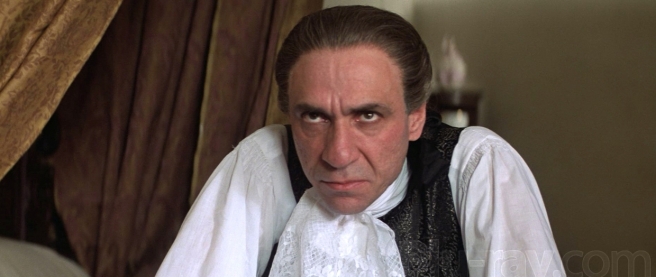In Mozart’s music, Salieri recognizes something divinely inspired, absolute, and perfect. But what he hears ruins him. Confronted by this beauty beyond his ability to achieve, Salieri suffers his own talent and success in agony. “Thirty years of being called ‘distinguished’ by people incapable of distinguishing!” he cries, as the Viennese cheer him, while casually disregarding the genius in their midst. “If I cannot be Mozart then I do not wish to be anything.” He gets his wish. Mozart is posthumously declared immortal, and Salieri, still alive, is utterly forgotten, the patron saint of the undistinguished. In his last line, the old, discarded court composer addresses the modern audience directly, all those who, like him, are not worth listening to. “Mediocrities everywhere—now and to come—I absolve you all,” he says, sympathizing with our failure to be Mozart. […]
The Salieri that Shaffer created hears with the ears of history; he knows all along what only later listeners could know. When Mozart arrived in Vienna in 1781, his talent was obvious and undeniable, but his genius was still a matter of opinion. He wasn’t yet Mozart. Peter Shaffer stacked the deck against Salieri by giving his self-doubts the weight of historical certainty. Because Salieri knows Mozart is a genius, his own failure then seems inevitable. But the real weight that he and every artist—every person who strives for greatness—suffers is the weight of not knowing. You must find in yourself the courage to leap off the cliff. Yet it is not up to you whether you fly or fall.
~ Glen Kurtz, Practicing: A Musician’s Return to Music
Image Credit: vjmorton

I always had a sneaking sympathy for Salieri. F. Murray Abraham did a marvelous job with that role in “Amadeus”.
LikeLiked by 2 people
Me too. And for me it was more than just sneaking. 🙂
LikeLiked by 1 person
hard not to feel for him. and well stated.
LikeLiked by 1 person
Yes. For him. For us walking in his shoes.
LikeLike
One of my all-time favorite movies…
LikeLiked by 1 person
Mine too!
LikeLike
There’s a lot to be said for mediocrity or just above average. When you *have* to be the best, the brightest, the immortal, there’s not much room for joy.
LikeLiked by 2 people
Yes, nicely stated. All that striving. No chance for peace or rest. Your thought reminds of the opposite, where I unfortunately often play:
LikeLiked by 1 person
That was a great movie and probably most of us had never heard of Salieri before seeing “Amadeus.”
LikeLiked by 1 person
I would have been one of those people.
LikeLiked by 1 person
It’s important to love what you do. Not for where it will take you.
Mozart said when composing, the whole symphony would come at once, like a white heat. Most of us are not blessed as he; most are more like Salieri; we must grind it out.
-Alan
LikeLiked by 2 people
I so agree with your thoughts on this topic Alan. This is how I march, right here.
LikeLiked by 1 person
Glen Kurtz “You must find in yourself the courage to leap off the cliff. Yet it is not up to you whether you fly or fall”. There is a strength in being still enough to hear, wise enough to know when to act, when to speak and to always extend love. I think he means we must yield, listen and embrace the journey…where ever it leads us. Life is a delicious gift.
LikeLiked by 1 person
Beautifully put Christie. I agree with your interpretation. Listen, Yield, embrace…right there.
LikeLike
I love the interpretation. Salieri is the patron of all who are “almost great.” Mozart may have been great, but as many a genius, he seemed way too eccentric for me. Although his music rocks….
LikeLiked by 1 person
Claudia, I’m 100% with you…
LikeLike
Reread, Glen Kurtz piece – some additional thoughts, Humbleness is important, comparing ones self to another causes conflict, dealing with frustration, patiently or not is a choice, while continuing to strive for personal excellence. The inward creativity, manifests itself passionately outwardly. It is true that the genius of some is never recognized until they are gone physically, leaving behind a beautiful gift of intrigue that captivates….I also think of the everyday life and the countless gifts of people that were shared only in a small circle, never to be recognized on paper, in a sound recording, on film, in cooking, etc but benefits many as a pieces of their substance lives on in others hearts, influencing…
LikeLiked by 1 person
Wonderful comment Christie. I found you last sentence to be true and most powerful…Thank you for sharing.
LikeLike
Reblogged this on It Is What It Is and commented:
” You must find in yourself the courage to leap off the cliff. ” …..
LikeLiked by 1 person
When you see your dreams being bettered by another, perhaps it means that you ahve other dreams to fulfill.
LikeLiked by 1 person
Well stated…
LikeLike
As a composer, Mozart seemed to have slipped backwards and forwards between the sublime and the flippant. Perhaps it was the latter that irritated Salieri — that Mozart did not always respect his own gift. I quite like some of cheeky little piano minuets, but his music is not my favourite to sing. I’m sure I’d feel differently if I was one of the 18th century castrati 😉
LikeLiked by 1 person
Smiling. I think you have it right (on Salieri believing that Mozart didn’t respect his own gift)
LikeLiked by 1 person